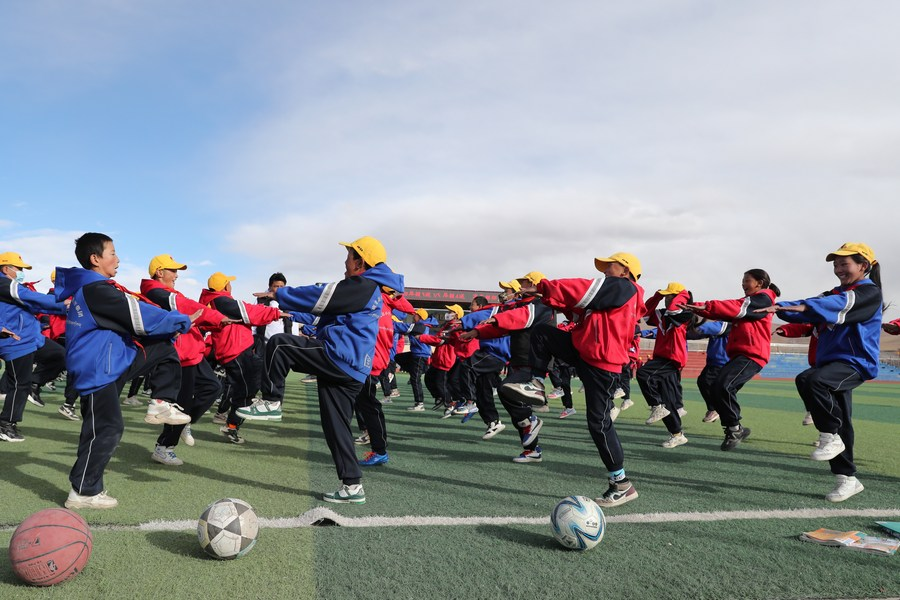Editor's note: In the following essay, Jawad Shabbir, a Ph.D. scholar at Peking University's School of Earth and Space Science who hails from Pakistan, writes about his thoughts on the educational landscape in China on the occasion of the International Day of Education.
The author at an art exhibition in Beijing. /CGTN
Peking University, January 24, 2024: International Education Day is observed annually on January 24th and is a global celebration honoring education's ability to promote sustainability, peace, and progress. A just and equal world is built on education. It builds the groundwork for a better future, empowers people and communities, and encourages tolerance and understanding. Due to many vulnerabilities such as poverty, violence, and other issues, millions of children and youth globally are deprived of their right to an education.
Children are compelled to escape their homes, schools are frequently damaged or closed, and teachers are targeted or relocated in war-torn areas. Due to the lack of availability of high-quality education in refugee camps and conflict areas, young people are more susceptible to radicalization and exploitation. Even in the face of these obstacles, education continues to be a ray of hope throughout difficult times. It may help create a culture of peace and understanding, provide them a sense of normalcy and stability, and give them the tools they need to reconstruct their lives.
We all have a part to play in promoting education in vulnerable environments on International Education Day. We may talk on social media and in the community about the difficulties and value of education in precarious situations. Contribute to or volunteer for groups that help kids in refugee camps and conflict areas get an education. Make sure that when your government and outside groups respond to humanitarian emergencies, they give priority to education.
By working together, we can make sure that every child has the chance to learn and grow, regardless of where they were born or what they have gone through. Recall that access to education is a basic human right, not an extravagance. Let's pledge to make sure that every child has the chance to learn and realize their full potential on this International Education Day.
Students do sports on the playground at the Baingoin County Sinopec Primary School in downtown Baingoin County, Nagqu, southwest China's Xizang Autonomous Region, Oct. 13, 2023. (Photo by Wang Jing/Xinhua)
Domestic Strength:
China has the most comprehensive nine-year compulsory education program in the world, with nearly universal enrollment. This has resulted in a notable increase in literacy rates and the development of a workforce with higher levels of skill. China has made significant investments in higher education, giving STEM subjects priority and growing the number of universities. As a result, there has been a significant increase in university graduates, advancing science and technology.
It also places a high priority on vocational training because it understands the importance of practical skills and wants to meet industry demands by giving people access to job-specific training. China is a leader in the use of AI-powered tools, online platforms, personalized learning models, and other technology innovations in education to enhance accessibility and the delivery of education.
Global outlook:
China is a popular destination for overseas students, promoting cross-cultural interaction and opening up business prospects. China promotes worldwide understanding and may have an impact on educational systems by providing scholarships and educational opportunities to students from underdeveloped nations. China influences foreign educational methods through exporting educational technology, such as learning software and online platforms.
Challenges:
Equal access to opportunities is a concern since, despite advancements, there are still gaps in the quality of education between urban and rural communities. The emphasis on rote learning and achievement on standardized tests in China's educational system may constrain critical thinking and creativity.
China has a large and diverse role in education overall, with both opportunities and difficulties. Evaluating its influence on the international scene requires an understanding of its internal conflicts, global influence, and home strengths.
Role of Peking University in Education:
Peking University (PKU) is an important institution in the education system in China and around the world, making significant contributions in a number of disciplines. PKU attracts outstanding students, faculty, and researchers and is routinely ranked among the best institutions in China and around the world.
This advances knowledge in a variety of subjects and creates a lively academic environment. A wide range of undergraduate and graduate degrees in the social sciences, natural sciences, humanities, and management are available at PKU. This broad program offers a well-rounded education while meeting the interests of a wide range of students. The faculty at PKU is highly regarded and includes academicians, Nobel laureates, and specialists in a variety of subjects. This guarantees that students have access to cutting-edge research and excellent coaching.
PKU encourages students to think critically, undertake research, and build autonomous learning skills in addition to teaching content found in textbooks. They get ready for both lifetime study and future careers as a result. PKU encourages students to have a comprehensive understanding of complicated issues by fostering collaboration across disciplines and dismantling academic silos. This gives students the tools they need to address problems in the actual world more effectively. PKU collaborates with foreign universities on cooperative research initiatives, exchange programs, and English-taught courses. Students are exposed to a variety of viewpoints, which broadens their perspective on the world.
Impact on Society:
Prominent roles in academia, industry, government, and civil society are occupied by PKU alumni. This influences international opinion and helps to shape China's destiny. Scientists at PKU do innovative research in a variety of disciplines, advancing science, technology, and medicine. Improved infrastructure, sustainable development, and healthcare are some of the ways that this helps society. Through academic programs, conferences, and events, PKU acts as a bridge between China and the rest of the globe, promoting cultural interchange and understanding. This promotes global collaboration and creates links among different social groups.
When everything is considered, Peking University is a brilliant beacon of scholarly achievement, innovative teaching, and social effect. It equips students to become responsible citizens who improve society as well as competent professionals. It has an indisputable impact on education, both domestically in China and internationally.
Written by: Jawad Shabbir
Edited by: Dennis Meng


